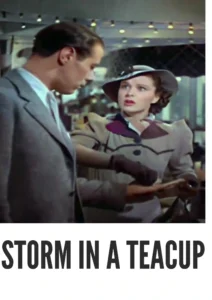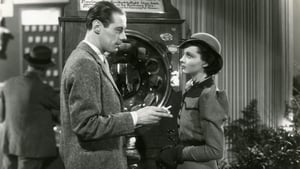Contact: info@alwanfilm.com
Video Sources 0 Views
Synopsis
Storm in a Teacup 1937 Colorized Review: A Charming Comedy of Errors

Introduction
In the realm of British cinema, the 1937 film Storm in a Teacup stands as a delightful example of the comedy genre, combining sharp wit, endearing characters, and a clever narrative. Directed by the talented Edward Ludwig, this film is a charming adaptation of the play The Storm in a Teacup by Ben Travers. The film showcases the talents of a stellar cast, including the beloved British actress Vivien Leigh, alongside the charming Rex Harrison. In this review, we will explore the film’s plot, characters, themes, and the critical reception it garnered upon release, while also considering its enduring appeal in the landscape of classic British comedy.
Check The Full Colorized Movies List
Check Our Colorized Movies Trailer Channel
Understanding Storm in a Teacup 1937 Colorized: Director, Cast, and Genre
Director’s Vision
Edward Ludwig’s direction in Storm in a Teacup reflects a masterful understanding of comedic timing and character-driven storytelling. Ludwig, who had a diverse film career, infuses the film with a light-hearted yet engaging tone, allowing the narrative to unfold with delightful rhythm. His ability to balance humor with poignant moments is evident throughout the film, as he guides the talented cast to create memorable performances that resonate with audiences.
The Iconic Performance of Actors
The film’s success is significantly bolstered by its remarkable cast. Vivien Leigh, known for her powerful performances and striking beauty, shines as the lead character, “Jenny.” Her ability to portray a range of emotions—from innocence to fierce determination—brings depth to her character and makes her relatable to viewers. Leigh’s performance is often considered one of the highlights of her early career, showcasing her talent well before she gained international fame with Gone with the Wind.
Rex Harrison, who plays the charming and witty “David,” complements Leigh perfectly. Harrison’s natural charisma and sharp comedic timing create a delightful on-screen chemistry between the two leads. Their banter and playful interactions drive the film’s plot and engage the audience, making it impossible not to root for their characters.
Exploring the Genre
Storm in a Teacup (1937) falls into the romantic comedy genre, characterized by its light-heartedness and focus on relationships. The film utilizes classic tropes of romantic comedy, including misunderstandings, witty repartees, and a resolution that brings the protagonists together. However, it also incorporates elements of social commentary, addressing issues of class and privilege in British society. This blend of comedy and social critique sets Storm in a Teacup apart from other films of its time, giving it a timeless quality that continues to resonate with audiences today.
Exploring the World of Storm in a Teacup 1937 Colorized: Plot and Characters
Detailed Synopsis
Storm in a Teacup (1937) follows the story of Jenny (Vivien Leigh), a young woman from a well-to-do family, and David (Rex Harrison), a witty and ambitious journalist. The film opens with Jenny and David crossing paths in their picturesque coastal town, where their initial meeting leads to a series of comedic misunderstandings and romantic entanglements.
As the plot unfolds, Jenny becomes embroiled in a scandal that threatens her reputation and her family’s standing in society. The town’s mayor, portrayed by the hilarious John Le Mesurier, exacerbates the situation with his bumbling antics, leading to an all-out farcical battle between the townspeople and the press. David, intrigued by Jenny’s plight, takes it upon himself to defend her and uncover the truth behind the scandal.
The film expertly weaves together various subplots, including the quirky townspeople, Jenny’s overbearing father, and the escalating media frenzy. As David investigates the scandal, he and Jenny develop a deeper connection, navigating the challenges of love amidst chaos. The climax culminates in a thrilling showdown that brings the community together and ultimately restores Jenny’s honor.
The Complex Protagonist and Memorable Supporting Characters
Jenny and David are well-developed characters who undergo significant growth throughout the film. Jenny starts as a sheltered young woman, but her experiences force her to confront societal expectations and assert her independence. David, initially portrayed as a self-serving journalist, evolves into a more honorable character as he fights for Jenny’s reputation.
The supporting characters add richness to the narrative, with each playing a crucial role in the comedic mayhem. Notably, the eccentric townsfolk provide humor and insight into the social dynamics of the community, showcasing the film’s ability to satirize class distinctions.
The Art of British Comedy
Understanding British Humor
Storm in a Teacup exemplifies the distinct flavor of British humor characterized by its wit, irony, and penchant for social commentary. British comedies often rely on wordplay, clever repartee, and situational irony to elicit laughter. The film employs these elements masterfully, creating a series of laugh-out-loud moments while also prompting viewers to reflect on the societal norms of the time.
The film’s dialogue is peppered with clever one-liners and satirical observations, making it a joy to watch. The comedic timing of the actors, combined with Ludwig’s direction, ensures that the humor never feels forced, allowing the story to unfold naturally.
Evolution of British Comedy
British comedy has a rich history that spans centuries, evolving from the comedic plays of Shakespeare to the modern sitcoms and films of today. Storm in a Teacup sits comfortably within this tradition, drawing on classic comedic tropes while also embracing the unique social context of 1930s Britain. The film’s ability to blend humor with poignant social commentary reflects the evolution of British comedy as a genre that entertains while also provoking thought.
Storm in a Teacup 1937 and Its Historical Context
A Reflection of British Society
Set against the backdrop of 1930s Britain, Storm in a Teacup offers insight into the social climate of the time. The film subtly critiques the class distinctions and societal expectations that defined British life. Through the lens of comedy, it highlights the absurdity of rigid social hierarchies and the ways in which individuals navigate these constraints.
The film’s portrayal of Jenny’s struggle against societal pressures resonates with audiences, as it speaks to the timeless theme of individuality versus conformity. As the characters confront their societal roles, the film encourages viewers to question the status quo and embrace their authentic selves.
The Influence of the Play
Storm in a Teacup is adapted from Ben Travers’ play The Storm in a Teacup, which debuted in 1936. The play’s success paved the way for its cinematic adaptation, and Travers’ sharp wit and keen observations of human behavior are preserved in the film. The transition from stage to screen allows for a broader exploration of the characters and their relationships, showcasing the strengths of both mediums.
The Themes Explored in Storm in a Teacup 1937 Colorized
Class and Society
One of the central themes of Storm in a Teacup is the exploration of class and societal expectations. The film cleverly juxtaposes the lives of the upper class with those of the working class, highlighting the absurdities and injustices inherent in the social hierarchy. Through the character of Jenny, the film challenges traditional gender roles and societal norms, encouraging viewers to consider the impact of privilege and reputation on personal identity.
The film’s humorous take on class distinctions serves as a reminder of the importance of authenticity and personal integrity, urging viewers to embrace their true selves regardless of societal expectations.
Love and Relationships
At its heart, Storm in a Teacup is a romantic comedy that explores the complexities of love and relationships. The evolving dynamic between Jenny and David is at the forefront of the narrative, showcasing their growth as individuals and as a couple. Their journey highlights the importance of communication, understanding, and mutual respect in romantic relationships.
The film’s portrayal of love is both lighthearted and sincere, capturing the joys and challenges that come with navigating romantic entanglements. As Jenny and David confront external obstacles, their bond strengthens, ultimately leading to a satisfying resolution.
Reception and Controversy Surrounding Storm in a Teacup 1937 Colorized
Initial Reviews and Audience Reactions
Upon its release, Storm in a Teacup (1937) received positive reviews from critics and audiences alike. Viewers were charmed by the film’s engaging storyline and the delightful performances of the cast. Vivien Leigh’s portrayal of Jenny garnered particular praise, solidifying her reputation as a talented actress capable of capturing a range of emotions.
Critics lauded the film for its clever dialogue and humorous take on social issues, noting its ability to entertain while provoking thought. The film’s comedic elements resonated with audiences, making it a popular choice among those seeking light-hearted entertainment during a tumultuous time in history.
Controversies and Criticisms
While Storm in a Teacup was largely well-received, some critics pointed out its reliance on familiar comedic tropes and predictable plot elements. However, these criticisms did little to diminish the film’s popularity. The charm of the characters and the witty script outweighed any concerns about originality.
As with many films of the era, Storm in a Teacup also faced scrutiny regarding its portrayal of class and gender dynamics. Some viewers questioned whether the film adequately addressed the complexities of these issues or if it merely skimmed the surface. Nevertheless, the film’s humor and heart ultimately resonated with audiences, solidifying its place in British cinema.
Where to Watch Storm in a Teacup 1937 Colorized Online
For those eager to experience Storm in a Teacup (1937), several streaming platforms offer access to the film. Classic cinema enthusiasts can find the film on platforms like Amazon Prime Video and various DVD collections dedicated to vintage British comedies. Additionally, Turner Classic Movies frequently features Storm in a Teacup as part of their programming, allowing viewers to appreciate this charming film in its full glory.
FAQs About Storm in a Teacup 1937 Colorized
Q: Who directed Storm in a Teacup (1937)?
A: Storm in a Teacup was directed by Edward Ludwig, known for his adeptness in bringing comedic stories to life on screen.
Q: What themes are explored in Storm in a Teacup?
A: The film delves into themes of class and society, love and relationships, and the complexities of individual identity in the face of societal expectations.
Q: How did audiences respond to the film upon its release?
A: Upon its release, Storm in a Teacup received positive reviews for its charming storyline, witty dialogue, and strong performances from the cast, particularly Vivien Leigh.
Q: Is Storm in a Teacup based on a play?
A: Yes, the film is adapted from Ben Travers’ play The Storm in a Teacup, which premiered in 1936.
Conclusion
Storm in a Teacup (1937) remains a delightful entry in the canon of British comedy, showcasing the talents of its cast and the sharp wit of its writing. Edward Ludwig’s direction, combined with Vivien Leigh’s captivating performance, creates a film that is both entertaining and thought-provoking. The exploration of class dynamics, love, and individuality resonates with audiences, making it a timeless classic.
As viewers immerse themselves in the charming world of Storm in a Teacup, they are invited to laugh, reflect, and appreciate the enduring legacy of this beloved film. Whether revisiting it as a nostalgic favorite or experiencing it for the first time, Storm in a Teacup continues to charm audiences with its delightful blend of humor, romance, and social commentary.









